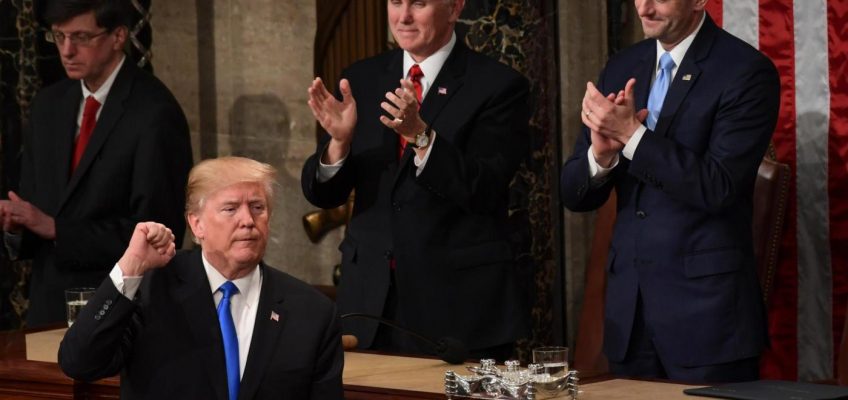By LISA MASCARO, AP Congressional Correspondent
WASHINGTON (AP) — President Donald Trump arrives this week on Capitol Hill to deliver a speech to Congress, a coequal branch of government he has bulldozed past this first month in office, wielding unimaginable executive power to get what he wants, at home and abroad.
The Tuesday night address will unfold in the chamber where lawmakers crouched in fear four years ago while a mob of his supporters roamed the halls, and where Nancy Pelosi, Liz Cheney and others vowed to prevent him from ever holding office again. It’s the same House chamber where Ukrainian President Volodymyr Zelenskyy received a hero’s welcome for fighting off Russia’s invasion, in the first year of that war.
Since his reelection, Trump has blazed across the federal government, dismantling not just norms and traditions but the very government itself. With billionaire aide Elon Musk by his side, he is firing thousands of federal workers, closing agencies established by law and publicly badgering Zelenskyy while positioning the U.S. closer to Russia.
As legal cases mount, more than 100 so far challenging the legality of the Trump administration’s actions, the Republican president is daring the other branches of government — Congress and the courts — to try to stop him.
“This whole thing about approaching a constitutional crisis is not quite true,” said Rep. James Clyburn, of South Carolina, a senior Democrat in the House. “We’re already there.”
Trump revels in going it alone, but there are limits
Reveling in the might of going it alone, Trump is about to test the limits of his executive branch authority as he turns to Congress to deliver tax cuts and other key aspects of his agenda. Only Congress, by law, can allocate funds — or pull them back — but the Trump administration’s actions have been testing that foundational rule, enshrined in the Constitution.
Trump also needs lawmakers to fund the government and ensure federal operations don’t shut down when money runs out March 14. And he will need Congress to pass legislation to prevent an economically damaging debt default, something he has pushed lawmakers to resolve.
While Trump enjoys the rare sweep of power in Washington, with the Republicans controlling the White House, the House and the Senate, he relies on political fear as well as favor to motivate lawmakers. With Musk having poured $200 million into electing Trump, the president has a ready patron whose vast political funds can influence any resisters.
House Speaker Mike Johnson, who has positioned himself as a partner to the president, has said he’s excited about what Trump is accomplishing in rooting out waste, fraud and abuse to downsize government.
“Fireworks,” is what Johnson, R-La., said he expects from Trump’s speech, dismissing as “nonsense” concerns that Congress is ceding too much power to the White House.
“The president is doing what he said on the campaign trail he would do,” Johnson said Sunday on Fox News Channel.
Democrats, after their stunning rejection by voters, are slowly beginning to mount a resistance. They are fighting Trump in court, with amicus briefs to protect federal workers, and filing legislation to serve as a check on what House Democratic leader Hakeem Jeffries of New York calls the “parade of horribles.”
But as the minority party, they are limited in their power. Jeffries brushed off calls for Democrats to boycott Trump’s address. “It’s the people’s House. It’s the House of Representatives,” he said on CNN.
Instead, Democrats are inviting fired federal workers as their guests.
Tax cuts and mass deportation funds all at stake
One of Trump’s top campaign promises, extending the tax breaks approved during his first term in 2017, is posing one of his party’s biggest challenges.
Johnson and Senate Majority Leader John Thune of South Dakota are marshalling the GOP majority to deliver what Trump calls a “big, beautiful bill” extending those tax breaks — and providing new ones. But Republicans also want some $2 trillion in budget cuts with changes to Medicaid and other services that millions of Americans count on, which Trump could decide is too much to bear.
Melania Trump goes to Capitol Hill to lobby for anti-revenge porn bill
Trump slams Zelenskyy for saying the end of the Russia war ‘is still very, very far away’
Trump sends crypto prices soaring after surprise announcement of strategic government reserve
Treasury ends enforcement of business ownership database meant to stop shell company formation
Mexico makes case to avoid US tariffs as it awaits Trump’s decision
Trump’s other big campaign promise — the biggest deportation operation in U.S. history — is running short of cash, and border czar Tom Homan has implored Republicans on Capitol Hill to loosen the purse strings to give the Homeland Security and Defense departments the money needed.
Those budget debates all come as the Trump administration is ripping the federal government apart and freezing federal funds. It’s challenging the Nixon-era Impoundment Control Act, which prevents the executive branch from halting allocations Congress has already approved, setting up a showdown that could wind up at the Supreme Court.
“Testing the boundaries a little, I would expect that,” said Rep. Steve Womack, R-Ark., who said he supports much of what the Trump administration is doing, to a point.
“We’ve got separate but equal branches of government,” said Womack, whose committee controls vast funding. “What we don’t want is, we don’t want a constitutional crisis.”
Lives, livelihoods and the echoes of Jan. 6
It’s not just constitutional issues at stake but the lives and livelihoods of Americans. Communities depend on federal dollars — for health care clinics, school programs and countless contracts for companies large and small that provide goods and services to the federal government. Many are watching that money evaporate overnight.
Republican Sen. Jim Justice of West Virginia, a former governor, said voters back home have concerns even as they support the idea of downsizing government.
“People are always afraid of the dark,” he said, citing potential changes to Medicaid and preschool programs in particular. “Let’s give it time to see really what materializes before we run through the streets with our hair on fire.”
And the threat of Jan. 6, 2021, hangs over the building.
Trump will stand on the dais where Pelosi, then the House speaker, was whisked to safety as the mob ransacked the Capitol. He will look out over the rows of lawmakers, some of whom blocked the back door to the chamber as Capitol Police were fending off rioters, steps away from where Trump supporter Ashli Babbitt was shot and killed. Visitors will be watching from the galleries where representatives crouched on the floor in gas masks before being evacuated.
The Supreme Court granted Trump’s presidential actions wide immunity from prosecution, and the four-count criminal indictment against him over Jan. 6 was withdrawn once he was reelected, in line with Justice Department policy.
In one of his first acts on Inauguration Day, Trump issued a sweeping pardon of all the rioters, including extremist leaders Stuart Rhodes and Enrique Tarrio, who were convicted of sedition. They have both returned to make appearances at the Capitol since their release from prison.
Sen. Peter Welch, D-Vt., was in the Capitol on Jan. 6.
“I acknowledge that he won and he’s got the right to use all the executive authority to pursue his policies. He doesn’t have a right to exceed constitutional authority,” Welch said. “So how he does this should be of great concern to all of us.”




